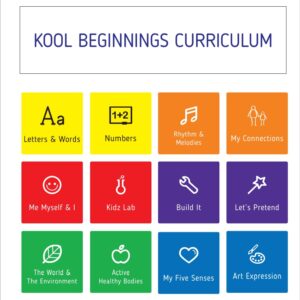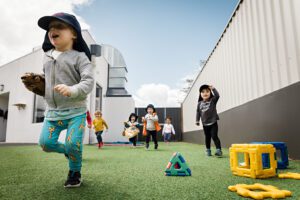What is Play-based learning?
According to the The Early Years Learning Framework for Australia, play-based learning is defined as ‘a context for learning through which children organise and make sense of their social worlds, as they engage actively with people, objects and representations’. Play is a human innate behaviour and through this, at an early age, we can help a child develop physically, socially and emotionally.
How is play-based learning implemented across all Kool Kidz services?
At Kool Kidz, there are three ways play-based learning is approached;
- Child initiated – The child is allowed free play and be spontaneous
- Guided – Initiated by the child or Educator with interactions by an Educator
- Educator led- An activity is organised and instructions are provided by the Educator
No matter which approach is taken, it encourages the child to talk, read, think and write. All the skills they need to prepare for school.
The Kool Beginnings Curriculum that is implemented across all services has its origins in play-based learning with 12 distinct areas of learning for a child to develop, grow and thrive. From personal development by understanding themselves and their connections with their educators and peers to broadening their knowledge through letters and numbers, science and the world around them.

To find out more about our 12 learning blocks, click HERE.
How does my child benefit from play-based learning?
- Social development
Through play, children learn to connect with one another and begin to learn about sharing, taking turns and listening. They also learn to communicate to one another, resolve conflict and problem solve to become aware of other’s emotions and be empathetic.
- Language development
Play based learning is a great way to engage children and build on their literacy and language skills. By reading one on one or as a group, children begin to recognise words and their meaning to enhance their vocabulary. Imaginary play builds their communication skills and the ability to express themselves with words.
- Cognitive development
By allowing a child to play, they begin to understand the world around them, which will enhance the way they think, understand, communicate and problem solve. A child playing with blocks may be asked by the educator about the height of their blocks, the number of blocks they need to build their castle, cause and effect questions like will your castle fall over if you have too many blocks.
- Physical development
While play has its health benefits, it also improves a child’s co-ordination, fine motor skills, balance, building on movement skills that are required as they remain active during their lifetime
- Creativity and imagination
Allowing a child to pretend further develops their creativity and imagination. It builds on a child’s skills to communicate, for self-expression, decision making as they control their imaginary environment and they learn to problem solve. Imaginary play builds their confidence level and teaches children to be innovative.

To read more about our play-based learning program click here [https://www.koolkidzchildcare.com.au/curriculum/]